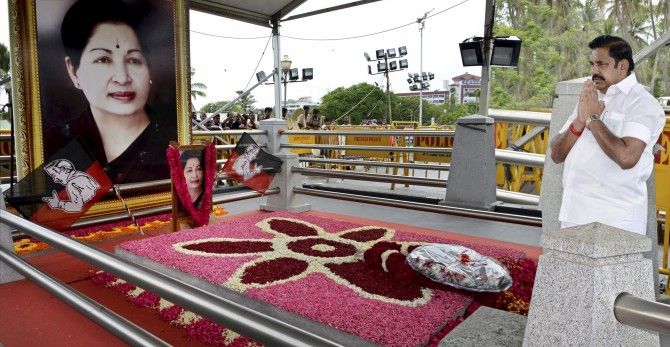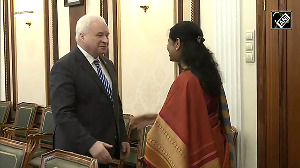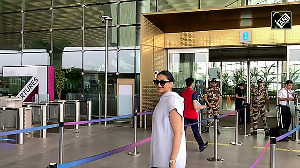It should not surprise anyone if either of the contending parties in the ‘TN speaker’s case’ comes up with a submission for referring the matter of ‘speaker’s powers’ to a Constitution Bench.
In political terms it could buy more time for the Edappadi camp, to settle down and stabilise itself, says N Sathiya Moorthy.

With the Centre telling the Supreme Court that the judiciary cannot interfere with the decisions of the speaker in a legislature, Tamil Nadu’s troubled Chief Minister Edappadi K Palaniswami (EPS) may have got more time to settle down and stabilise his position within his ruling AIADMK and government than otherwise.
Appearing for the Union of India at the behest of the court after new attorney-general K K Venugopal recused himself from the case, solicitor-general Ranjit Kumar submitted as much before a two-member bench headed by Justice Dipak Misra.
The Bench has now fixed August 9 for the solicitor-general to make out his case in full before proceeding in the matter.
There is no denying the constitutional issues involved in the question of judicial intervention in the administrative decisions of the speaker of a legislature or that of the legislature as a whole.
It remains to be seen if the two-judge bench in its wisdom will decide to refer the matter to a larger Constitution Bench as the larger legal/constitutional question has been agitated not so infrequently in the Supreme Court and various high courts over the past several years and decades.
In February this year, then attorney-general Mukul Rogtogi took the same position in the ‘Aadhar case’ as SG Ranjit Kumar has now done on Pandiarajan’s petition.
The issue then related to Lok Sabha Speaker Sumitra Mahajan notifying the ‘Aadhar bill’ as a ‘money bill’, and thus outside the binding purview of the Rajya Sabha, where the government did not have a majority.
In the TN case, petitioner Pandiarajan has sought a direction for speaker Dhanapal to conduct a ‘secret ballot’ as against ‘roll call’. His counsel conceded the point that the TN assembly rules indicated only head-count, but submitted that there was no bar on the speaker to do otherwise, especially when sought by a section of the house.
It should not surprise anyone if either of the contending parties in the ‘TN speaker’s case’ comes up with a submission for referring the matter of ‘speaker’s powers’ to a Constitution Bench.
Should it happen, it is also not unlikely that other state legislatures and the Centre may seek to join the proceedings, to arrive at a judicial finality in the matter.
While any such reference of the Pandiarajan petition to a Constitution Bench could lead to a legal and judicial finality in the matter, in political terms it could buy more time for the Edappadi camp, to settle down and stabilise itself.
As petitioners in the Supreme Court, the rival OPS faction cannot complain if the court refers the matter to a Constitution Bench.
From within what has now come to be identified as the ‘Edappadi faction’, AIADMK ‘deputy general secretary’ TTV Dinakaran will not have any more purchase if his efforts were to lead to the government’s exit ultimately and fresh elections.
In these months after the December 5, 2016, death of incumbent chief minister and charismatic party supremo Jayalalithaa, no AIADMK legislator from any faction wants to face the voters.
The OPS group may sound relatively more confident than the other two. Yet, Panneerselvam too cannot be so sure of cornering all ‘Mukkulatore’ community votes traditionally going the AIADMK way.
Despite perceptions of party cadres going the whole hog with the OPS faction, the fact remains that the Dinakaran camp, identified even more with his jailed aunt, V K Sasikala Natarajan, may have some purchase.
This can weaken OPS’s vote contribution to electoral victory that his faction hopes for. This is also because OPS and the Sasikala family belong to two different subsects of the Mukkulathore community, with dominant three in the reckoning all the time.
Should the Edappadi and Dinakaran factions patch up before any future elections, it may strengthen the cadre support for them.
Already, with no real challenge from another ‘Kongu Vellalar’ community leader from the predominantly western belt of the state identified with AIADMK’s electoral victories as with the Mukkulathore in the south, any patch-up within the ruling faction could weaken the OPS camp even more.
Even while proceeding with the Supreme Court case, the OPS faction has sought the Election Commission’s permission to conduct ‘party elections’ to elect a new ‘general secretary’ for the AIADMK.
This move is aimed at reviving the pending ‘symbol case’ which is now before the Election Commission, what with the OPS faction submitting that Sasikala Natarajan was not duly-elected general secretary, as prescribed under the party by-laws.
In all this, CM Palaniswami’s fight with the Sasikala-Dinakaran camp is over positions of politico-administrative power and non-interference in the day-to-day affairs of the government, which had brought a bad name even to the Jayalalithaa leadership in her time.
Having taken a ‘principled position’ that the Sasikala-Dinakaran camp were ‘outsiders’ of sorts to the party organisation and were responsible for all that has gone with the AIADMK and the government whenever the party was in power in the State, the OPS camp cannot settle any intra-party dispute that easily through negotiations.
Their chances lie in convincing the Election Commission about the lack of legitimacy attaching to Sasikala’s election as general secretary, and start off from the starting block all over again.
For them, the issue is over the ‘Two Leaves’ symbol, which is also of equal concern for the Edappadi and Dinakaran factions.
Hence, also the occasional rumours/talks about talks for re-uniting the party and retrieving the MGR-Jaya symbol, now frozen by the Election Commission.
Such a patch-up alone will help the three faction leaderships to concentrate on the party’s future (whoever inherits it, collectively or otherwise) from going ahead with time-consuming court cases that may still flow from any decision and direction of the Election Commission.
For now, the OPS faction is satisfied with targeting the Opposition DMK, both inside and outside the assembly, for allegedly striking a deal with CM Edappadi-led faction within the ruling party.
The reference is to the trust vote that the CM sought on the directions of Governor Ch Vidyasagar Rao. Speaker Dhanapal ejected them from the house for ‘unruly behaviour’ before the trust vote, which the ruling faction won convincingly.
However, the OPS faction does not talk about their staying away from the no-trust move against speaker Dhanapal, when moved subsequently by the DMK, and based on the latter’s conduct and decision over Edappadi’s trust-vote.
The DMK has gone to the Madras high court over that issue. The OPS faction went to the Supreme Court on the Speaker’s other decision over the voting method, instead.
N Sathiya Moorthy, veteran journalist and political analyst, is Director, Observer Research Foundation, Chennai Chapter.











